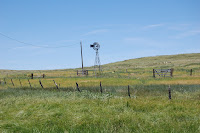1. Use little details. Often it is those little things that King mentions in a story that makes it so much more real. For instance in his bestseller, Mr. Mercedes, he has someone back in the past driving a Datsun. It's not just a car; it's a Datsun, a specific model. His character Det. Hodges, sits in a La-Z-Boy, not just a lounger. We may not even know the difference between that sort of lounger and others, but again, it's something specific.
2. Turn something unknown into something fearful. I remember listening to the audio version of his book Desperation about driving into a deserted town in the desert as I was driving from Las Vegas to Los Angeles. There weren't many little towns on that highway, but I remember fearing that I might suddenly arrive at the desert town of Baker and suddenly find it deserted instead of being the place I normally stopped for gas and a Diet Coke. And I remember the fear of driving across a small strip of Oklahoma that was very empty and worrying about what unknown territory might be out there. King can take that small fear of the unknown and blow it up into something big. We can all relate to that.
3. Use all the senses in a scene. This is something I constantly teach in writing classes. Is your
 character greeting someone at the airport? Don't forget all the noise and bustle around the person--women with crying babies, people shouting at each other to hurry or in greeting, people jostling others to get ahead of them. What about the smells? People always seem to remember smells except when they are writing. I remember standing beside the Olympic torch in Vancouver and being overwhelmed not by the crowd around, or even the damp chilly day, but by the smell of the fuel that was keeping it lit.
character greeting someone at the airport? Don't forget all the noise and bustle around the person--women with crying babies, people shouting at each other to hurry or in greeting, people jostling others to get ahead of them. What about the smells? People always seem to remember smells except when they are writing. I remember standing beside the Olympic torch in Vancouver and being overwhelmed not by the crowd around, or even the damp chilly day, but by the smell of the fuel that was keeping it lit.4. Sharpen the focus on your characters. Again it is often the small details that bring a person to life, whether it is a habit that the person often does or a quirk. Years ago I wrote a series of short stories for an anthology with another writer and when we were coming up with new characters for each story he always started out with a character's quirk. I thought it was a fun thing to do, but as we developed the stories around a certain theme, I found those quirks were very useful in bringing those characters to life.
5. Experiment. Try something different, something you haven't done before. It might be a short story when you are used to writing long or it might be a longer story when you normally write short. Try writing a science fiction or fantasy if you normally write romances or a mystery. Just stretching your imagination can be fun not only as a way to take a break but also to give new vitality to your writing when you go back to your normal work.
And finally remember those scenes as you edit. As you go through your work before sending it off or publishing it, see how much you notice about the scene and read it as though you were a reader, seeing it for the first time. Are you giving your readers a real picture? A story they can step into and enjoy? If not, then look for some of these ways to make the picture come alive.





